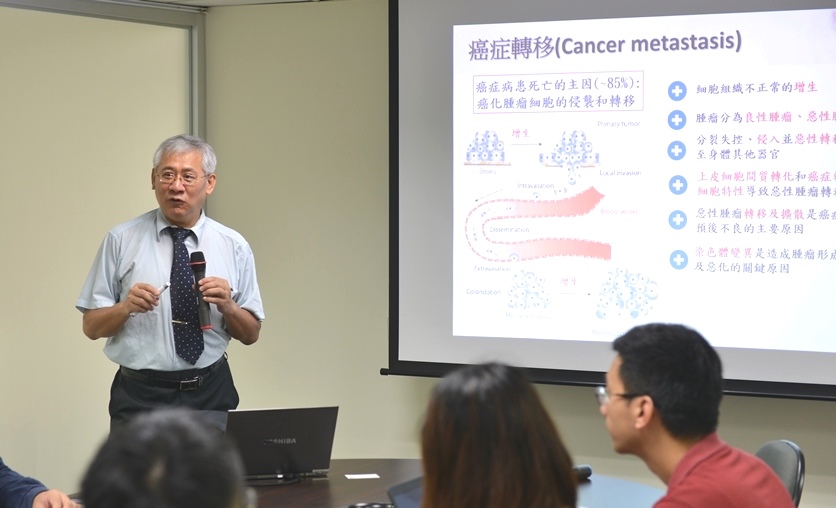Date: 2018-05-02
Scientists have uncovered a key oncogene that controls the proliferation and metastasis of cancer cells! In their latest study, research fellow Dr. Yuh-Shan Jou, postdoctoral researcher Dr. Hsi-Wen Yeh, and their research team at the Institute of Biomedical Sciences of Academia Sinica, have found that the paraspeckle component (PSPC1) gene, which is overexpressed in the final stages of cancer causes cancerous cells to proliferate, metastasize, and invade normal tissues.
Dr. Yuh-Shan Jou commented that this discovery of PSPC1 is a key regulatory gene for controlling the deterioration and spread of cancer is uncovered by the scientific community. In the future, if scientists can figure out how to inhibit the PSPC1 oncogene, then it will be possible to reduce the growth and spread of cancer cells and contribute to the development of new and more effective cancer drugs.
Tumor metastasis and the invasion of cancer cells are the main causes of death in cancer patients. However, the mechanisms of metastatic reprogramming in tumor progression remained elusive to scientists. Previous studies have shown that the activation of the transforming growth factor beta 1 (TGF-β1), a secreted protein that performs various cellular functions, is a key mechanism of cancer metastasis. In general, TGF-β1 controls cell growth, cell proliferation, cell differentiation, and apoptosis, activating cytostasis to sustain homeostasis in normal cells. However, this protein exerts dichotomous roles. In contrast to normal cells, in cancerous cells, TGF-β1, in its altered gene expression, acts in the opposite manner, promoting the proliferation, invasion, and metastasis of cancer cells. During the late and advanced stages of cancer, TGF-β1 can be found in large amounts in tumor tissues. Yet, exactly how this “two-faced” protein functions has puzzled scientists since the specific function of TGF-β1 varies depending on the progression of cancer.
To identify the key factor for cancer metastasis and the specific role that TGF-β1 plays, Dr. Yuh-Shan Jou and his team used integrated cancer genomic approaches to study and analyze tissue samples of malignant tumors from lung cancer, breast cancer, liver cancer, and prostate cancer to look for gene mutations, abnormalities, and other factors related to the survival rate of patients.
In their analysis of tumors, they identified PSPC1 as a master modulator for the metastatic switch. They also found that PSPC1 is upregulated or overtly expressed in tumor tissues and also responsible for reprogramming the TGF-β1 protein in cancer cells. In other words, in normal cells, PSPC1 is expressed in low levels, and TGF-β1 functions normally, inhibiting cell proliferation; however, when expressed in high levels in cancer cells, PSPC1 interacts with the Smad2/3 protein, which are main signal transducers for receptors of the TGF-β1 protein, to increase TGF-1 expression and the autocrine signaling of cancer cells. More importantly, PSPC1 preferentially switches Smads targets from cytostatic genes in normal cells to pro-metastatic ones in malignant cancer cells, ultimately creating a favorable environment for the growth and proliferation of cancer cells.
Poor prognosis and low survival rates in cancer patients are also highly correlated with the over-expression of PSPC1. Besides promoting the proliferation and metastasis of cancer cells, PSPC1 also increases epithelial-mesenchymal transition (EMT) and the growth of cancer stem cells (CSC). As such, if the over-expression of PSPC1 can be suppressed, both cancer cell growth and proliferation can subsequently be reduced.
Dr. Yuh-Shan Jou noted that both the discovery of the lead role that the PSPC1 oncogene plays in reprograming the mechanism of cell proliferation as well as the corresponding changes found in the function of the TGF-β1 protein are novel and cutting-edge breakthroughs in the field of cancer research. These results offer scientists new food for thought regarding cancer cell proliferation and also shows PSPC1 as a new theranostic target for drugs that can counter cancer metastasis, spurring progress in anticancer drug research.
This study was published online in Nature Cell Biology on March 28, 2018 and highlighted as a featured article in the News & Views section of the April 2018 issue.
The full research article entitled “PSPC1 mediates TGF-β1 autocrine signaling and Smad2/3 target switching to promote EMT, stemness and metastasis” is available online through the Nature Cell Biology website at: https://www.nature.com/articles/s41556-018-0062-y. Associated content from a related article, “Paraspeckle factor turns TGF-β1 pro-metastatic,” is also available on the Nature Cell Biology website at: https://www.nature.com/articles/s41556-018-0078-3.
The lead author of “PSPC1 mediates TGF-β1 autocrine signaling and Smad2/3 target switching to promote EMT, stemness and metastasis” is Dr. Hsi-Wen Yeh. Co-authors include Dr. Yuh-Shan Jou and his research team, Dr. Ruey-Bing Yang (Research Fellow, Institute of Biomedical Sciences, Academia Sinica), Dr. Ching-Feng Cheng (Joint Appointment Associate Research Fellow, Institute of Biomedical Sciences, Academia Sinica and Tzu Chi University), Dr. Ruey-Hwa Chen (Distinguished Research Fellow, Institute of Biological Chemistry, Academia Sinica), Dr. Chian-Feng Chen (Associate Research Fellow, Genome Center, National Yang Ming University), and Dr. Chiung-Tong Chen (Director, Institute of Biotechnology and Pharmaceutical Research, National Health Research Institutes).
-
Mr. Chung-Hui Chuang, Media Team, Secretariat, Central Administrative Office, Academia Sinica
(02) 2789-8820,chchuang@gate.sinica.edu.tw
-
Chang-Hung Chen, Public Affairs Section, Secretariat, Academia Sinica
(02) 2789-8059,changhung@as.edu.tw









 Home
Home


